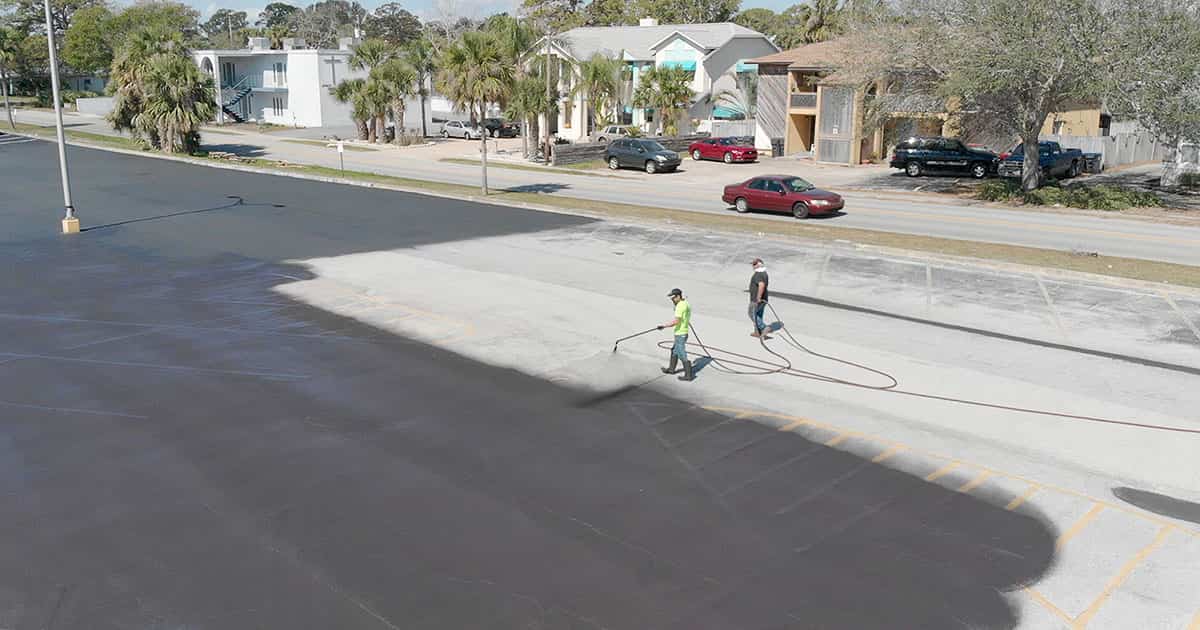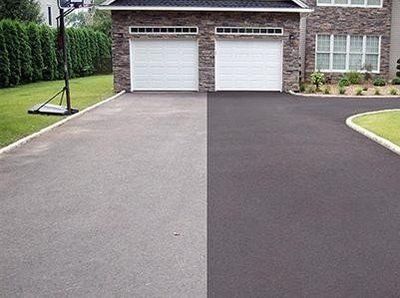Release the Possible: Regrading and Asphalt Sealing for Commercial Spaces
Release the Possible: Regrading and Asphalt Sealing for Commercial Spaces
Blog Article
Warm Mix Asphalt: A Lasting Solution for Pavement
Warm Mix Asphalt (HMA) has actually arised as a leading sustainable selection for pavement solutions, offering a myriad of ecological benefits and cutting-edge technologies. As the need for green building techniques grows, discovering the nuances of HMA's sustainability can provide useful insights right into the future of sidewalk services.
Environmental Advantages of Warm Mix Asphalt

In Addition, Hot Mix Asphalt aids to reduce city heat island results. Its dark color soaks up sunshine, decreasing the amount of warmth reflected back right into the ambience compared to lighter-colored sidewalks. This can lower ambient temperatures in city areas, reducing the need for air conditioning and eventually reducing energy usage.
On top of that, Hot Mix Asphalt adds to boosted stormwater management. Its porous nature enables water to penetrate the sidewalk and reenergize groundwater materials, minimizing drainage and the threat of flooding. These environmental benefits make Hot Mix Asphalt a sustainable choice for paving highways and roads.
Power Efficiency in HMA Manufacturing
Is energy performance a crucial element in the manufacturing of Warm Mix Asphalt (HMA)? Energy plays a significant duty in the production of HMA, impacting both expense and environmental sustainability. One crucial element of power effectiveness in HMA production is the usage of warm mix asphalt (WMA) modern technologies.
Furthermore, improvements in plant technologies have led to even more energy-efficient HMA production processes. By maximizing power usage in HMA manufacturing, the sector can reduce its carbon footprint while keeping high-quality pavement products.
Recyclability of Warm Mix Asphalt
The recyclability of Hot Mix Asphalt (HMA) is an essential facet of its sustainability and long-lasting ecological influence. HMA is one of the most recycled materials in the USA, with over 100 million loads of recovered asphalt sidewalk (RAP) being recycled each year in new pavement building. Reusing HMA supplies several environmental benefits, such as minimizing the demand for virgin products, reducing power intake during production, and lowering the quantity of waste sent out to land fills.
The procedure of recycling HMA includes grating the existing pavement, crushing it right into smaller sized pieces, and mixing it with new accumulation and asphalt binder to produce a recycled mix. In general, the recyclability of HMA plays a significant role in advertising sustainable practices within the sidewalk market.

Long-Term Efficiency of HMA
Asphalt sidewalks show longevity and resilience over an extended period, showing the long-lasting performance of Warm Mix Asphalt (HMA) The long life of HMA can sites be connected to its ability to endure heavy website traffic loads, extreme climate problems, and the results of aging. Researches have revealed that properly designed and appropriately constructed HMA pavements can last for two decades or even more with routine maintenance. The secret to making best use of the lasting efficiency of HMA lies in using top quality materials, following ideal methods in building, and executing effective upkeep approaches. Correct drain, routine inspections, and prompt repair services are necessary for protecting the structural honesty of HMA sidewalks in time. Additionally, advancements in HMA modern technology, such as the usage of polymer-modified binders and cozy mix asphalt, have even more boosted the sturdiness and longevity of HMA sidewalks. By prioritizing top quality building and upkeep methods, HMA remains to verify itself as a economical and sustainable remedy for durable pavement infrastructure.

HMA: Resilience and Sustainability
Showing both toughness and sustainability, Hot Mix Asphalt (HMA) has actually ended up being a foundation in the building and construction of durable pavement infrastructures - commercial parking lot paving. HMA's toughness comes from its capability to hold up against heavy loads, extreme climate condition, and high website traffic volumes, making it a trusted option for highways, highways, and flight terminal paths. The composition of HMA, which normally includes click reference aggregates, binder, and filler, plays a crucial function in boosting its longevity and resistance to tear and put on
Moreover, HMA's sustainability depends on its recyclability and energy-efficient manufacturing procedure. The ability to reuse recovered asphalt sidewalk (RAP) in brand-new HMA mixes minimizes the need for virgin products and minimizes the environmental effect of sidewalk building and construction and maintenance. In addition, the power efficiency of producing HMA lies in its reduced blending temperatures compared to other pavement materials, causing lowered power intake and greenhouse gas emissions.
Conclusion
Finally, hot mix asphalt (HMA) provides a sustainable service for pavement with its ecologically friendly qualities. HMA's recyclability, energy effectiveness in production, and long-lasting toughness make it an environmentally friendly option for Website road building. By conserving natural resources, reducing waste, and lowering greenhouse gas exhausts, HMA plays a crucial duty in advertising sustainability in framework growth. Its capacity to minimize city warm island impacts even more underscores its importance in creating ecologically conscious and resilient sidewalk systems.
HMA is one of the most recycled materials in the United States, with over 100 million bunches of recovered asphalt pavement (RAP) being recycled yearly in brand-new pavement construction.The procedure of recycling HMA includes crushing the existing pavement, crushing it into smaller items, and mixing it with brand-new aggregate and asphalt binder to develop a recycled mix.Asphalt pavements show toughness and resilience over an extended duration, reflecting the lasting performance of Hot Mix Asphalt (HMA) In addition, developments in HMA modern technology, such as the use of polymer-modified binders and cozy mix asphalt, have actually even more boosted the longevity and long life of HMA pavements. The capability to recycle reclaimed asphalt pavement (RAP) in brand-new HMA mixtures reduces the need for virgin products and reduces the ecological influence of pavement construction and maintenance.
Report this page